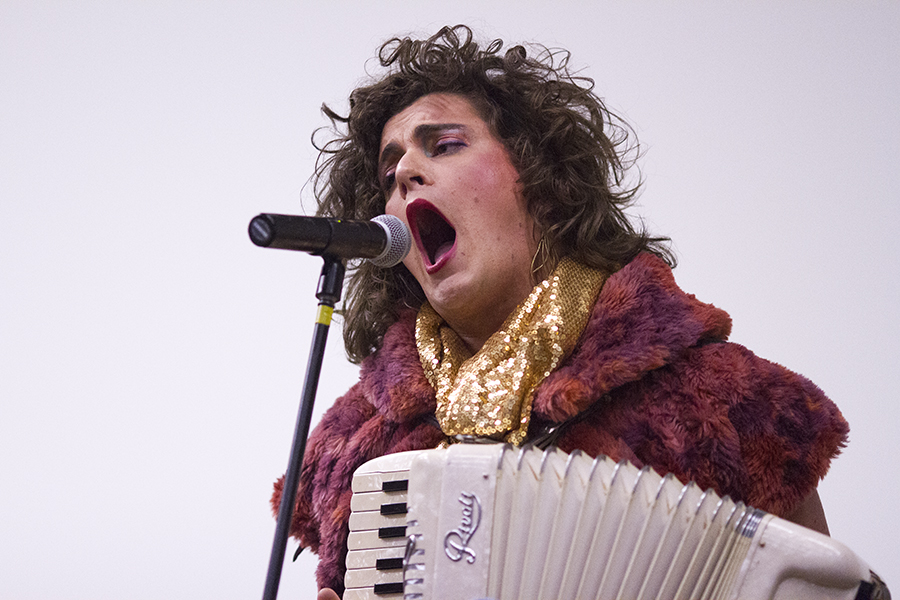
I honestly didn’t know what to expect when I first entered HUB 302 last Wednesday night. As I waited for Sister Spit to begin, I bumped into plenty of fellow writers from the creative writing department, and our shared sentiment was that we were attending Sister Spit because it had been the hot topic on everyone’s lips for the past few weeks due to the fascinating description on the event’s Facebook page. “2 vans chock-full with cutting-edge dyke female writers and performers,” it said. Sounds like my kind of evening.
As I soon discovered, Sister Spit was an exciting, funny and thoroughly thought-provoking presentation from a dynamic lineup of queer-influenced artists. The evening began with an introduction and reading by Michelle Tea, co-founder of Sister Spit in the 1990s. She provided background on the traveling troupe of writers and performers, who tour the country with an ever-changing lineup and seek to nurture queer artists and audiences.
Danny LéVesque’s reading from his new novel, “Hairdresser on Fire,” was an excellent, darkly comedic story of an adolescent struggling to support his passion for the art of clowning. Delivered in a steady deadpan, LéVesque was hilarious (“Everything I believe about Christianity is from ‘Jesus Christ Superstar,’” he explained) and set the tone for the evening as an exploration of themes of identity in the face of seemingly insurmountable obstacles.
Creative writing professor Susan Straight followed up this theme with an excerpt from her latest novel, “Between Heaven and Here.” She opened with a personal account of the time her mother said, “You’re really ugly and you’re probably never going to be married,” which sounds depressing but was delivered with enough of an upbeat attitude to inspire laughs from the packed audience. Straight began her reading by explaining, “You can write about things without having experienced them,” but her prose––which featured an intimate look into cracked-out life in Rio Seco, a fictionalized representation of Riverside––was so immersive that I felt like I had experienced addicted family members and life-or-death struggles.
Cristy C. Road read from “Spit and Passion,” a novel about being in the closet and struggling with the potential of losing her culture. “I kept my identity to myself as soon as I found it,” she said. The backdrop of her presentation was a slideshow of her art, which included images from her childhood, culture and life, and helped reinforce the idea that a distinct rift formed during her early years between her family and her burgeoning identity.
Ali Liebegott stole the show and my heart. She had planned to read from her novel, “Cha-Ching!” but spent a good chunk of time detailing her experience of being gifted an excessive amount of ultimately unsatisfying dipping sauce from Ranch One at the University Village, which was awkward and wonderful and a joy to hear. Liebegott’s excerpt followed her anecdotal humor with one of the best frog jokes I have ever heard (and which I subsequently memorized for future laughs).
Each presenter brought a sense of lightheartedness to their performance as they explored hard-hitting themes, which I think is because humor is one of the best ways for an audience to share and understand important topics like gender and identity. Something about laughing about Road’s explanation of Ren and Stimpy’s gay romance, or Liebegott’s passion for Oprah and room service, gave the audience common ground with the speakers and created an environment of support and open minds.
The evening continued with TextaQueen, “Australia’s felt-tip super-hero,” according to the event’s Facebook page. Texta showcased self portraits from their series, “Unknown Artist.” The portraits, which were created entirely with felt-tipped markers, explore different aspects of Texta’s identities and are absolutely phenomenal, particularly those that critique whiteness and coloniality. One image portrays Texta as a white, zombie Gandhi, which sounds offensive but completely works on paper. Texta argued against idolizing people of history and turning them into figures of worship, particularly since these people are faulted humans, not deities.
Guest speaker and creative writing professor Nalo Hopkinson read from her novel, “Sister Mind,” which draws from Christina Rossetti’s poem “Goblin Market” and is about the relationship between a pair of half human/half deity twins. It was a beautiful reading, but was overshadowed by songwriter DavEnd’s totally dynamic accordion presentation.
DavEnd presented improvised songs from her musical, “Fabulous Artistic Guys Get Overtly Traumatized Sometimes,” which explored the effects of street harassment on the development of queer identity. I loved it. I want to be DavEnd’s best friend. As her song soared into an operatic soprano, she described the effects of being called a “faggot” on her way home, and followed it up by quipping, “Even if transgender rights don’t happen in my lifetime, I’d like to think someone would help an opera star.” Very true, DavEnd. Overall, it was a fun and dynamic performance that closed the night on a bang.
Sister Spit was wonderful, its lineup was beautiful, and you can follow all of their adventures at radarproductions.org.








